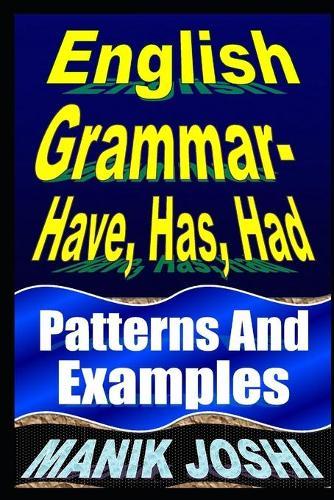Overview
This book covers the following topics: verb - 'to have' -- part (a). ordinary verb -- 'have' -- part (b). auxiliary verb -- 'have' -- 1. have/has/had + third form of verb -- 2. have/has/had + been + third form of verb -- 3. have/has/had + been + -ing form of verb -- 4. have/has/had + been -- 5. have/has/had + had -- part (c). modal verb -- 'have' -- 1a. [have/has ] to + first form of verb] -- 1b. [have/has ] to + be + third form of verb] -- 2a. [had ] to + first form of verb] -- 2b. [had ] to + be + third form of verb] -- 3a. [have/has ] had + to + first form of verb] -- 3b. [have/has ] had + to + be + third form of verb] -- 4a. [had ] had + to + first form of verb] -- 4b. [had ] had + to + be + third form of verb] -- 5a. [having ] to + first form of verb] -- 5b. [to ] have + to + first form of verb] -- exercises: 1(a) and 1(b) -- exercises: 2(a) and 2(b) -- exercises: 3(a) to 3(c) --- Sample This: -- VERB - 'HAVE' -- The Verb 'HAVE' is used as an AUXILIARY VERB as well as a MAIN (ORDINARY) VERB. It also does the function of 'MODAL VERB'. --- MAIN VERB: When used as the main verb, the verb 'have' is followed by an object. AUXILIARY VERB: When used as an auxiliary verb, it forms the perfect and perfect continuous tenses. [Note: 'Auxiliary verb' is a verb that is used with the main verb to show tenses, etc.] --- MODAL VERB: 'Modal verb' is a verb that is used with the main verb to express intention, permission, possibility, probability, obligation, etc. Following patterns are possible: ""have to, has to, had to, have had to, has had to, had had to, having to"" --- FORMS OF VERB 'HAVE': Present form - Have or Has; Past form - Had; Past Participle form - Had --- IMPORTANT POINTS ABOUT THE VERB 'HAVE' - 'Have' Is Used With the Subject 'I, We, You and They' + All Plural Subjects; 'Has' Is Used With the Subject 'He and She' + All Singular Subjects; 'Had' Is Used With All Subjects (Singular or Plural) --- USE OF 'HAVE GOT' - In some senses, you can also use 'have got'. 'have got' is especially used in 'British English'. She has got a loose temper. (= She has a loose temper.) I have got a backache. (= I have a backache.) He has got a management degree (= He has a management degree.) --- PART (A). Ordinary Verb -- 'HAVE' - As the Main Verb, 'Have' is used to express different kinds of thoughts: Some of them are as follows: to possess, to own, to show quality, to show a feature, to suffer from illness, to perform a particular action, to produce a particular effect, to trick, to cheat, to hold, to experience, to receive, to allow, to put in a position, etc. When used as the main verb, 'have' is followed by an object. - I have an American passport. He has an American passport. She had an American passport. --- Negative Forms Of Main Verb 'Have': Have - Do not have (Don't have); Has - Does not have (Doesn't have); Had - Did not have (Didn't have) - I don't have an American passport. He doesn't have an American passport. She didn't have an American passport. NOTE- Instead of using do/does/did, you can also use modal verbs (may, can, must, should, etc.) in negative sentences to show possibility, intention, obligation, etc. - I may not have an American passport. He may not have an American passport. She may not have an American passport. You can also use 'Never have/Never has/Never had' to emphasize negative statements. - I never have my breakfast at 7 am. This park never has any trace of greenery. We never had the guts to question him. --- Interrogative Patterns Of Main Verb 'Have': Have - Do + Subject + Have; Has - Does + Subject + Have; Had - Did + Subject + Have --- Do I have an American passport? Does he have an American passport? Did she have an American passpo
Full Product Details
Author: Manik Joshi
Publisher: Createspace Independent Publishing Platform
Imprint: Createspace Independent Publishing Platform
Volume: 18
Dimensions:
Width: 15.20cm
, Height: 0.50cm
, Length: 22.90cm
Weight: 0.145kg
ISBN: 9781497597891
ISBN 10: 1497597897
Pages: 102
Publication Date: 25 January 2014
Audience:
General/trade
,
General
Format: Paperback
Publisher's Status: Active
Availability: Available To Order

We have confirmation that this item is in stock with the supplier. It will be ordered in for you and dispatched immediately.
Author Information
Manik Joshi was born on Jan 26, 1979 at Ranikhet and is permanent resident of Haldwani, Kumaon zone of India. He is an Internet Marketer by profession. He is interested in domaining (business of buying and selling domain names), web designing (creating websites), and various online jobs (including 'self book publishing'). He is science graduate with ZBC (zoology, botany, and chemistry) subjects. He is also an MBA (with specialization in marketing). He has done three diploma courses in computer too. ManikJoshi.com is the personal website of the author.




